Obama pledges support for ‘inspiring’ Tunisia
US president announces financial aid package, training and development for the North African country.

 |
| Obama, right, called the events in Tunisia an ‘inspiration’ [EPA] |
President Barack Obama has pledged US support for Tunisia’s political and economic development as he welcomed the North African nation’s prime minister to the White House for a meeting steeped in symbolism.
“The United States has enormous stake in seeing success in Tunisia and the creation of greater opportunity and more business investment in Tunisia,” Obama said after an Oval Office meeting with Prime Minister Beji Caid Sebsi on Friday.
Washington hopes Tunisia’s progress toward democracy will set an example others will follow after faltering steps in that direction by Egypt, and Obama discussed an aid package worth $50m in loan guarantees and enterprise seed capital.
“Given that Tunisia was the first country to undergo the transformation we know as the Arab Spring, and given it is now the first to have elections, we thought it was appropriate that Tunisia would be the first to visit the White House,” he said.
Tunisia’s popular uprising toppled its autocratic ruler Zein al-Abidine Ben Ali in January, sparking similar movements that have reshaped the political landscape of the Arab world.
Tunisia will hold elections on October 23. Some 11,000 candidates representing 110 parties will contest 218 seats in an assembly to rewrite the country’s constitution.
“Tunisia has been an inspiration to all of us who believe that each individual man and woman has certain inalienable rights, and those rights must be recognised by a government that is responsive and democratic,” Obama said.
“We are deeply encouraged by the progress that has already been made in this short period of time.”
Training and development
The president said the US would play a strong, supportive role as Tunisia transitions toward full democracy. Following the meeting, the White House announced plans to work with Congress to provide up to $30m in loan guarantees to Tunisia and to launch a $20m Tunisia Enterprise Fund to support private sector growth.
In addition, the Peace Corps will return to Tunisia starting early next year, with volunteers focusing on English language training and youth development programmes.
Essebsi thanked the US for its early support of Tunisia’s democracy movement and said he hoped the transformation taking place in his country would be replicated elsewhere in the region.
“Up until now, the Arab Spring is only really the Tunisian Spring. So what I do hope is that this Arab Spring will not limit itself exclusively to Tunisia and that it will spread throughout the region,” Essebsi said through
a translator.
The prime minister’s comments underscored a concern that while democracy protests have taken hold throughout the Arab world, their effectiveness has been uneven.
The protests in Tunisia quickly spread to neighbouring Egypt, where massive public protests forced the ouster of longtime President Hosni Mubarak. Elections there are scheduled for November.
In Libya, rebels led the charge to end the four decade-long regime of Muammar Gaddafi.
Elsewhere, protest movements have been stymied, often by harsh crackdowns by government-backed forces, notably in Syria and Yemen.